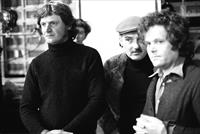Writers
Story consultant on Year 1 up to End of Eternity
Born in 1941, Penfold was the son of a vicar in Bristol and educated at Cambridge University, Penfold joined Australia's ABC, becoming a writer and producer in radio and TV. His first break was on the TV series My Brother Jack (1965), which co-starred young Australian actor Nick Tate. He returned to England to work in industrial documentaries, before becoming story editor on the series The Pathfinder. He wrote the Cliff Richard film Take Me High (1973).
In 1982 he created and wrote the series The Brack Report, a 10-part drama series set in the world of nuclear power. In 1985 he wrote the second series of The Tripods. He was script editor of One by One (1987), and All Creatures Great And Small (1988), writing scripts for the latter into 1990, and The Bill (early 1990s, over 100 episodes). He wrote episodes for the top British soap EastEnders (1990) and Casualty (1990). In 1998 set up his script production company, ScriptWorks. From 1999- 2014, he was script editor on Midsomer Murders. He was also script editor on the films Conspiracy of Silence (2001, won Screenwriting Award at Cannes), The Summerhouse (2008), The Search (2009).
His father-in-law at the time had worked for the British rocket programme. He was a convention guest at Fanderson Gold (1996), Main Mission (New York, 2000), Standby For Action (2002), Moonbound 2004 (Italy, 2004), Alpha 2012 (Los Angeles, 2012), Alpha: 2014 (Peterborough, 2014), The Future Is Fantastic (Maidenhead, 2015). He joined internet conventions in 2021 and 2022.
He appeared in The Space: 1999 Documentary (1996), and These Episodes (2005). He wrote the foreword and afterword to William Latham's Space 1999 novels Omega and Alpha (2010). Penfold autographed a card for Unstoppable cards (2016). He wrote the foreword, some chapters and footnotes for To Everything That Might Have Been: The Lost Universes of Space: 1999 (2022).
He died in 2024.

Script editors on the set, March 1974. Christopher Penfold (left), Edward Di Lorenzo, and Johnny Byrne
FAB 33 (interviewed in 1997): I was certainly interested in the idea of making popular the kind of science fiction which dealt unashamedly with metaphysical ideas. And in the first series of Space 1999 a lot of episodes, not all of them, but a lot of them, confronted some of those issues head on. I think they made very good programmes.
As the series developed, the increasing concerns of ITC for a kind of science fiction which I felt very alien to me began to have the effect of undermining the scripts which were being written. We had very good scripts which had to go back to the drawing board to meet a requirement which had come from Abe Mandell, who didn't appear to have any understanding that if you take one strand out of a script, it effects everything else in the script. So a lot of rewriting, needless rewriting, went on and this had the effect of bringing the scripts further and further behind schedule. The difficulties eventually came to a head and Gerry asked me to leave the series. I don't remember having any severe falling out with him, but I realised the way the wind was blowing as far as story content was concerned and I was, at that point, utterly exhausted anyway.
(Interviewed in 2002): Space fiction stories are mainly thought of as action adventure. What we were engaged in Space 1999 was of course action adventure, but it was also ideas adventure. We weren't afraid of big ideas in series one, it was what drove us on day to day, it gave us a huge sense of excitement.
Copyright Martin Willey